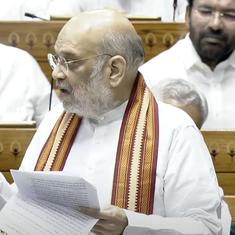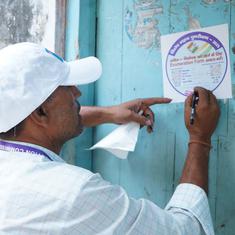Crores of workers to be excluded as Aadhaar-based system made mandatory for MGNREGS, claims Congress
According to government data, 12.7% of the active workers under the scheme were ineligible for the Aadhaar-based system.

The Union government has made it mandatory that all workers under the Mahatma Gandhi National Rural Employment Guarantee Scheme, or MGNREGS, are paid through an Aadhaar-based payment system, reported The Hindu.
However, 34.8 % of those who hold job cards under the scheme, which guarantees 100 days of work for every rural household in the country, were still ineligible for the payment system as of December 27, according to Union Rural Development Ministry data, reported The Hindu.
The Congress alleged that on account of the mandate, crores of people will be prevented from earning a basic income.
For workers to be paid under the Aadhaar-based payment system, their Aadhaar details have to be seeded to their job cards and bank accounts and the Aadhaar details need be mapped with the database of the National Payments Corporation of India. Then, the institutional identification number of the bank needs be mapped on the National Payments Corporation of India database.
On February 1, the Centre had made it mandatory for all payments under the scheme to be made through the Aadhaar-based payment system. Earlier, the workers had the option to choose a bank account-based payment.
However, since then, the Centre had extended the deadline to make the system mandatory five times. The last extension ended on December 31.
The NREGA Sangarsh Morcha, a workers’ collective focused on the social security scheme, had said that it was difficult for workers to meet the requirements of the payment system, describing it as a “complex, cumbersome and unreliable system”.
LibTech India, a consortium of academics and activists, said that the names of 7.6 crore workers have been deleted from the system in the past 21 months.
“Compelling the use of ABPS [Aadhaar-based payment system] with more than one-third of the total MNREGA registered workers rendered ineligible will inevitably lead to the denial of the right to work,” said Chakradhar Buddha, a senior researcher at Lib Tech India, according to The Hindu. “This stands in direct contravention to the Act passed by the Parliament.”
He added said the government should not only revoke the mandatory implementation of the payment system but also direct states to reinstate erroneously deleted workers and give compensation for the loss of work opportunities.
Also read:
- ‘Struggling to buy even soap’: Their wages unpaid, Bengal MNREGA workers being pushed into poverty
- MGNREGS workers deprived of wages due to Aadhaar-based payment system, says Jean Drèze
Case-by-case exemptions possible, says Centre
In response to The Hindu report, the Centre on Monday said it could consider exemptions from the Aadhaar-based payment system on a case-by-case basis if gram panchayats face difficulties with it.
The government contended that the figure of 34.8% registered workers not being eligible for the Aadhaar-based payment system has no relevance, as the question of payment only arises when a registered beneficiary turns up to seek employment.
According to The Hindu, 12.7% of active workers were not eligible for the Aadhaar-based payment system as on December 27.
The Centre defines active workers as those who have worked at least one day in the last three years. Of the 25.25 crore registered workers under the scheme, 14.35 crore are categorised as active workers.
The government said that it has decided to use the Aadhaar-based payment system to ensure that workers receive their wages even if their bank accounts frequently change.
The ministry of rural development also said that job cards can be only deleted under certain specific conditions, and not due to the payment system. It said that a job card can be deleted in cases when it is a fake or duplicate, when the household is not willing to work, when the family has shifted from the gram panchayat permanently, or when the card holder has died.
‘Cruel New Year gift’: Congress
The Congress described the Centre’s decision as Prime Minister Narendra Modi’s “cruel New Year gift” that would prevent crores of workers from earning a basic income under the scheme.
“The Indian National Congress also reiterates its demands from 30th August, 2023, that the Modi government should stop weaponizing technology, especially Aadhaar to deny the most vulnerable Indians their social welfare benefits, release delayed wage payments and implement open muster rolls and social audits to improve transparency,” Congress General Secretary (Communications) Jairam Ramesh said.
He alleged that Prime Minister Narendra Modi’s “well-known disdain” towards the scheme has translated into a number of experiments such as the payment system, digital attendance, drone monitoring and the proposed integration of facial recognition into the digital attendance.
“No due consultation or scientific piloting was done before unleashing these ‘experiments’ on crores of Indians,” he added.
Indian National Congress condemns the Prime Minister’s cruel New Year gift to exclude crores of the poorest and marginalised Indians from earning a basic income through public works under the Mahatma Gandhi National Rural Employment Guarantee Act (MGNREGA).
— Jairam Ramesh (@Jairam_Ramesh) January 1, 2024
The Indian National… pic.twitter.com/ykWAhaexL7









